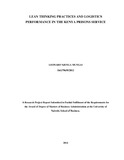| dc.description.abstract | One of the main objectives of many companies and Kenya
Prison
department as well is
performance improvement. This objective is achieved by different firms through
application of different strategies like adoption of lean thinking practices. Depending on
factors like nature of work, management support, employee competence and motivation,
and resource availability, different lean practices provide different outcomes after
adoption. Lean thinking practices includes but not limited to 5s, demand pull,
standardization, value stream mapping, process flow simplification and quality upgrade.
Adoption of these practices lead to such benefits as cost reduction, efficiency, improved
customer service and satisfaction and also
business
economic growth. The research
design used in this study was case study and the target population consisted of the
officers attached to different directorates in the Prisons Headquarters based in Nairobi.
The researcher used both primary and secondary data. Secondary data consisted
of
the
reference
books and documents used in the management of Prison Service. The primary
data was collected through a drop and pick later questionnaire. The responses were
analyzed using tables
and appropriate
clarifications aided by SPSS software package.
There
were three objectives under study including the extent of Lean thinking practices
adoption, the relationship between logistics performance and lean practice adoption as
well as challenges involved in adoption.
Linear multiple regression model was used to
analyze the relationship objectives while the challenges and lean thinking practices
adoption extent were analyzed using descriptive statistics. The study found out that even
though lean thinking practices adoption is mostly beneficial, some practices did
not quite
support the performance improvement e.g. process flow simplification, standardization
and use of problem solving groups. The study also found out that there were many
challenges hindering lean practice adoption. The study concluded that as many lean
practices as possible should be adopted but those that do not add value in performance
should either be avoided or enabling adoption environment created. The challenges in
adoption of lean thinking practices should be eliminated or minimized to ensure
that
these practices are adopted for improved performance | en_US |

